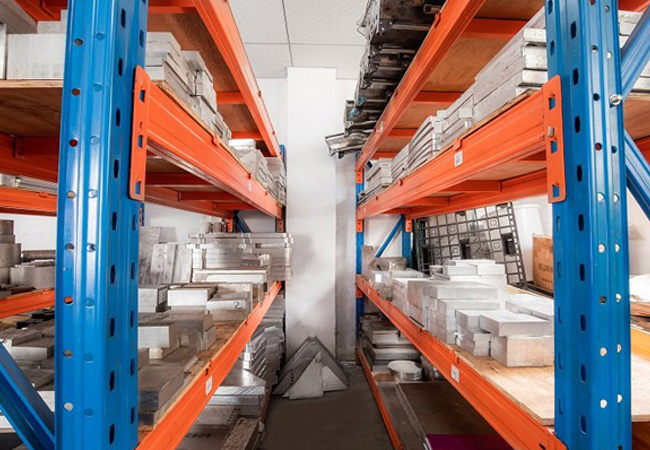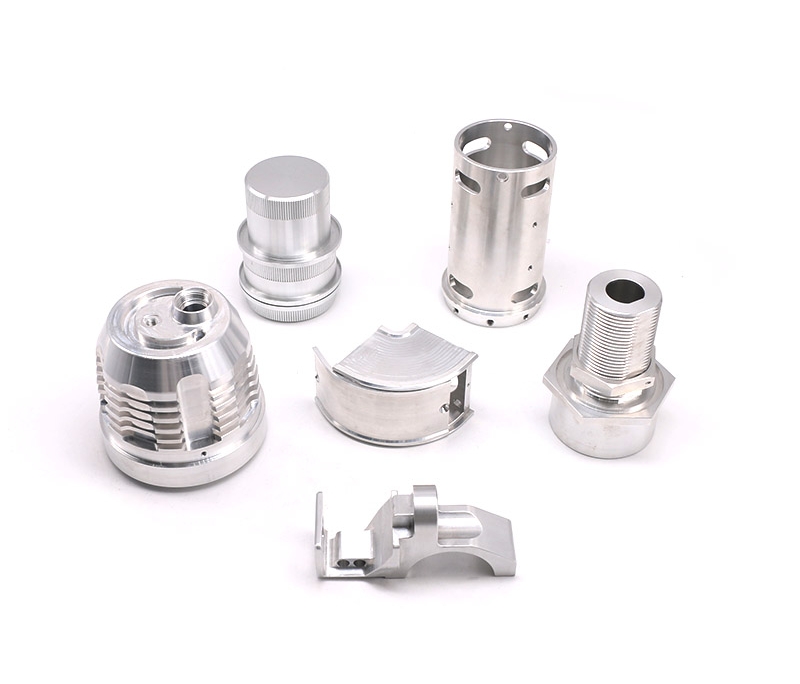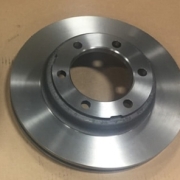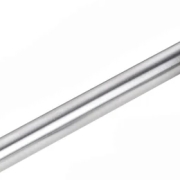Is Aluminium Magnetic? A Comprehensive Guide
Aluminum is one of the most commonly used metals in the CNC machining field, from household items to industrial applications. But when it comes to its magnetic properties, many people wonder: Is aluminum magnetic? This common question arises from its widespread use in various industries, yet its magnetic properties remain a mystery to many. Understanding whether aluminum is magnetic is crucial for making the right material choices in manufacturing.
Aluminum is not magnetic in the traditional sense. It exhibits paramagnetic properties, meaning it is weakly attracted to magnetic fields but doesn’t retain magnetism. This behavior is due to its atomic structure, which lacks the necessary electron configuration to create a permanent magnetic field.
This article explores why aluminum is not magnetic, how it reacts to magnets, and its relevance in various industries.
What is Aluminum?
Aluminum is a lightweight, corrosion-resistant metal that is widely used in manufacturing and construction. With a density of about 2.7 g/cm³, it is one of the lightest metals, which makes it ideal for applications where weight is a concern. Aluminum is primarily used in the aerospace, automotive, and packaging industries, as well as in household goods such as cans and kitchenware.
Aluminum is also a good conductor of electricity and is non-toxic, making it an essential material in electrical systems. Despite its many useful properties, the most notable feature for our discussion is its non-magnetic nature.

Comparison of Aluminium with Other Metals
To better understand aluminum’s lack of magnetism, it’s useful to compare it with other metals like iron, nickel, and copper.
Iron: A classic example of a ferromagnetic metal. Iron has domains in its atomic structure where electron spins align, making it strongly magnetic.
Nickel: Like iron, nickel is ferromagnetic, with properties similar to iron but weaker.
Copper: Copper, like aluminum, is paramagnetic, but it has an even weaker response to magnetic fields.
Basic Properties of Aluminium
Aluminium is a lightweight, durable metal known for its excellent conductivity, corrosion resistance, and malleability. It is commonly used in industries ranging from aerospace to electronics and packaging.
Density: Aluminium is less dense than many metals, making it ideal for lightweight applications.
Conductivity: Aluminium is a good conductor of electricity, often used in electrical wiring and components.
Corrosion Resistance: The metal naturally forms a protective oxide layer that shields it from corrosion, a critical feature for outdoor applications.
What is Magnetism?
Magnetism refers to the force that can attract or repel objects due to the movement of electric charges. It is a fundamental force, affecting everything from tiny particles to massive objects. Magnetism in materials is generally categorized into three types: ferromagnetism, paramagnetism, and diamagnetism. Understanding these distinctions helps explain why some metals like iron are magnetic, while others like aluminum are not.
Ferromagnetic materials, like iron and nickel, have regions where electrons’ spins are aligned, allowing them to create a strong, permanent magnetic field. In contrast, paramagnetic materials, like aluminum, experience weak attraction when placed in a magnetic field, but they do not retain magnetism once the field is removed. Diamagnetic materials, such as bismuth, actually repel magnetic fields.
What is Diamagnetism and Paramagnetism?
To understand aluminum’s magnetic behavior, it’s important to first explore diamagnetism and paramagnetism:
Diamagnetism refers to materials that exhibit a very weak repulsion to magnetic fields. This effect is so subtle that it can only be detected with precise instruments. Examples of diamagnetic materials include copper and gold.
On the other hand, paramagnetism describes materials that are weakly attracted to magnetic fields. In the case of aluminum, this attraction is brief and faint, meaning the material doesn’t retain any magnetic properties once the external field is removed.
Is Aluminum Magnetic?
Aluminum is not magnetic in the way metals like iron or steel are. It is considered a non-magnetic metal because it does not exhibit ferromagnetism. Ferromagnetic materials, such as iron, are strongly attracted to magnets, but aluminum does not stick to magnets. So, the simple answer to the question “Is aluminum magnetic?” is no, aluminum is not magnetic in the traditional sense.
However, aluminum does possess weak magnetic properties, making it paramagnetic. This means that aluminum is only weakly attracted to a magnetic field, but the attraction is negligible under normal conditions.
Aluminum’s Magnetic Properties Explained
The reason aluminum is not magnetic is because it is paramagnetic. In paramagnetic materials, the magnetic field can align some of the electrons, but these materials do not retain magnetization after the external field is removed. Unlike ferromagnetic materials, such as iron, which have magnetic domains that remain aligned even after the external magnetic field is removed, aluminum lacks this property.
The magnetic permeability of aluminum is relatively low, meaning it does not effectively conduct magnetic fields. This is why aluminum does not attract magnets the way metals like steel or iron do.
How Magnetic is Aluminium?
Aluminum is weakly magnetic, but its magnetic properties are so faint that they are virtually imperceptible in everyday situations. When a strong magnet is brought close to aluminum, it may exhibit a slight attraction. However, this force is too weak to cause the magnet to “stick” to the material.
Even when a powerful magnet is held near aluminum foil or thin sheets of aluminum, there is little to no noticeable magnetic interaction. The magnetism of aluminum is far weaker than that of ferromagnetic metals such as iron, cobalt, or nickel.
How Does Aluminium React to Magnets?
When a magnet is brought near aluminum, the reaction is subtle and brief. Aluminium doesn’t become magnetized, but it can experience a very faint magnetic attraction due to its paramagnetic nature. However, this attraction is so weak that it cannot make the aluminum stick to the magnet.
In simple terms, a magnet will not stick to aluminum under normal conditions. This is why aluminum is not attracted to magnets in everyday scenarios, unless under extremely high magnetic fields or temperatures.
Is Aluminium Attracted to a Magnet?
Despite common misconceptions, aluminum is not attracted to a magnet. When a magnet is brought close to aluminum, the force of attraction is too weak to hold the magnet against the material. This is in contrast to ferromagnetic materials, such as iron, which are strongly attracted to magnets.

Are Magnetic Metals Stronger than Non-Magnetic Metals?
Magnetic metals, such as iron, are often stronger than non-magnetic metals like aluminum. This is because ferromagnetic materials have a higher magnetic permeability and are naturally stronger in their interactions with magnetic fields. However, aluminum’s lack of magnetism makes it better suited for applications where magnetic interference could be problematic, like electronics and medical devices.
Can Aluminium Be Magnetized?
Aluminum is not easily magnetized. Due to its weak paramagnetic properties, it does not retain any magnetism once the external magnetic field is removed. Even under strong magnetic fields, aluminum will not become magnetized in the same way that iron or steel can. This makes aluminum unsuitable for permanent magnets, but ideal for uses where permanent magnetism is not required.
Factors Affecting Aluminium’s Magnetic Properties
There are several factors that can influence the magnetic behaviour of aluminum. While aluminum is generally paramagnetic, meaning it is weakly attracted to magnetic fields, various conditions can slightly alter or influence this response. These factors include temperature, external magnetic fields, and the purity of aluminum.
1. Temperature:
Temperature can affect aluminum’s magnetic properties. As a paramagnetic material, aluminum’s weak magnetic response may change slightly with temperature variations. At higher temperatures, the atomic motion increases, which may lead to a reduction in the alignment of the unpaired electrons that contribute to paramagnetism. This could slightly decrease its magnetic susceptibility.
On the other hand, at low temperatures, the alignment of unpaired electrons might become slightly more pronounced, potentially making the magnetic response a bit stronger. However, these changes are typically small and do not significantly alter aluminum’s overall weak magnetic behavior.
Aluminium does not undergo a transition like ferromagnetic materials (such as iron), which can experience a drastic change in magnetic properties at certain temperatures (like the Curie point). Therefore, temperature variations only slightly affect the paramagnetic behavior of aluminum.
2. External Magnetic Fields:
When aluminum is subjected to a strong external magnetic field, it experiences a weak attraction. The unpaired electrons in its atoms align slightly with the magnetic field, but since aluminium is paramagnetic, this alignment is very weak. This means that aluminum is attracted to a magnetic field, but the force is minimal.
Once the external magnetic field is removed, aluminium does not retain any magnetism. It will not act as a magnet or continue to exhibit any magnetic properties once the field is gone. This is a key characteristic of paramagnetic materials: they do not retain magnetism after the external influence is removed.
For comparison, ferromagnetic materials like iron will retain magnetism even after the external field is no longer present, which is not the case for aluminium.
3. Purity of Aluminum:
The purity of aluminum can influence its magnetic properties. Higher purity aluminum typically has fewer structural defects and a more uniform atomic arrangement, which can lead to a more consistent paramagnetic response.
Purity is particularly relevant in applications where the magnetic behavior of aluminum is being carefully considered, such as in electronic devices. In these cases, pure aluminum might show a slightly more noticeable paramagnetic effect than alloys that contain other metals.
When aluminum is alloyed with other elements (such as copper, magnesium, or zinc), these elements can modify the material’s overall electron configuration. Depending on the nature of the alloying elements, the magnetic properties of the alloy might differ from those of pure aluminum. In some cases, alloyed aluminum may exhibit weaker paramagnetic properties, or in rare cases, if the alloy contains magnetic elements, it could show some enhanced magnetic characteristics. However, the material will still remain predominantly paramagnetic.
4. Crystal Structure and Grain Boundaries:
The grain structure and processing method of aluminum can also have a minor effect on its magnetic properties. The alignment of aluminum’s atomic structure—whether the material is cast, extruded, or rolled—can slightly influence how its magnetic dipoles respond to an external field.
For instance, smaller grain sizes or certain crystal structures could allow for a slightly more efficient alignment of the magnetic dipoles in the material, which might marginally enhance its paramagnetic response. However, this effect remains small compared to the influence of other factors like temperature or purity.
Industrial Relevance of Aluminium’s Magnetic Properties
Although aluminum is not magnetic, its lack of magnetic properties makes it an ideal material for a wide range of applications in various industries.
Electronics and Telecommunications
Aluminum is widely used in electronic devices and telecommunications due to its non-magnetic nature. This is important because magnetic materials can interfere with electrical components. The fact that aluminum does not attract magnets ensures that it does not disrupt the operation of sensitive electronic devices.

Medical Equipment
In medical equipment, especially in imaging technologies such as MRI machines, non-magnetic materials like aluminium are essential. Magnetic canisters or other medical tools must not be magnetically reactive, making aluminum the ideal material choice.
Aerospace and Transportation
In aerospace, the non-magnetic nature of aluminium is crucial. Aircraft, satellites, and other transportation systems need to avoid interference from magnetic fields, so aluminum is frequently used in aircraft components.
Construction and Infrastructure
Aluminium’s non-magnetic properties are also beneficial in the construction industry. As an essential material in electrical systems and building structures, aluminum helps ensure that magnetic fields do not disrupt the performance of buildings or infrastructure.
Consumer Goods
From household appliances to packaging, aluminium’s non-magnetic properties make it safe for use in a wide array of consumer goods. Products like magnetic trays and aluminium magnets are designed with the material’s non-magnetic properties in mind.
Aluminium vs Magnetic Materials (Comparison Table)
Here’s a more comprehensive comparison of Aluminum, Diamagnetic Materials, and Ferromagnetic Materials (like Iron, Nickel, Cobalt) with respect to their magnetic properties:
| Property | Aluminum (Paramagnetic) | Diamagnetic Materials | Ferromagnetic Materials (Iron, Nickel, Cobalt) |
|---|---|---|---|
| Magnetic Type | Paramagnetic | Diamagnetic | Ferromagnetic |
| Magnetic Permeability | Low | Very low | High |
| Magnetic Susceptibility | Positive, weak (2.2 x 10^-5) | Negative (repels magnetic fields) | High (e.g., 3 x 10^-4 for Iron) |
| Response to Magnetic Field | Weak attraction | Repels magnetic fields | Strong attraction, can retain magnetism after field removal |
| Electron Configuration | Few unpaired electrons | Paired electrons | Many unpaired electrons |
| Magnetic Behavior | Weakly attracted, no magnetism retention | No attraction, repels magnetic fields | Strongly attracted, retains magnetism |
| Examples | Aluminum | Gold, Mercury, Copper, Bismuth | Iron, Nickel, Cobalt, Steel |
| Common Uses | Aerospace, Electronics, Packaging, Aircraft | MRI, Precision Instruments, Superconductors | Motors, Magnets, Transformers, Electrical Devices |
| Magnetism Retention | No retention after external field removal | None | Retains magnetism after field removal |
| Behavior in Magnetic Field | Slightly aligns with the field but weakly | Expels the field (e.g., floating above strong magnets) | Aligns strongly with the field and becomes magnetized |
| Magnetization | Does not become magnetized | Does not become magnetized | Becomes magnetized in the presence of an external field |
In Conclusion
Aluminum is not magnetic. While it is weakly attracted to magnets due to its paramagnetic properties, this effect is negligible in most applications. Aluminum’s lack of magnetism makes it a valuable material in industries like electronics, medical equipment, and aerospace, where magnetic interference can be problematic. By understanding the properties of aluminum, manufacturers can make informed decisions about when and where to use this versatile material.
With over a decade of expertise in CNC machining, VMT is your trusted partner for precision aluminum machining services. From CNC turning and milling to precision CNC machining and sheet metal fabrication, we deliver exceptional solutions tailored to meet the highest standards of quality and accuracy. Every detail matters, and we ensure flawless results every step of the way.
Blog About the Magnetic Properties of Different Materials
Frequently Asked Questions
Is Aluminum Foil Magnetic?
No, aluminum foil is not magnetic. Aluminum is a non-magnetic material, meaning it does not attract or stick to magnets under normal conditions.
Is Copper Magnetic?
No, copper is not magnetic. Like aluminum, it is a non-magnetic material and will not be attracted to magnets. However, it can exhibit weak magnetic properties under very strong magnetic fields.
Is Aluminum a Magnetic Material?
No, aluminum is not inherently a magnetic material. It is classified as paramagnetic, which means it has a very weak and temporary reaction to magnetic fields but does not retain any magnetism.
Will a Magnet Stick to Aluminum?
No, a magnet will not stick to aluminum. Aluminum’s paramagnetic properties are too weak to create a noticeable attraction to regular magnets.
What type of Magnetic Material is Aluminum?
Aluminum is a paramagnetic material, which means it slightly aligns with an external magnetic field but does not retain any magnetic properties once the field is removed.





